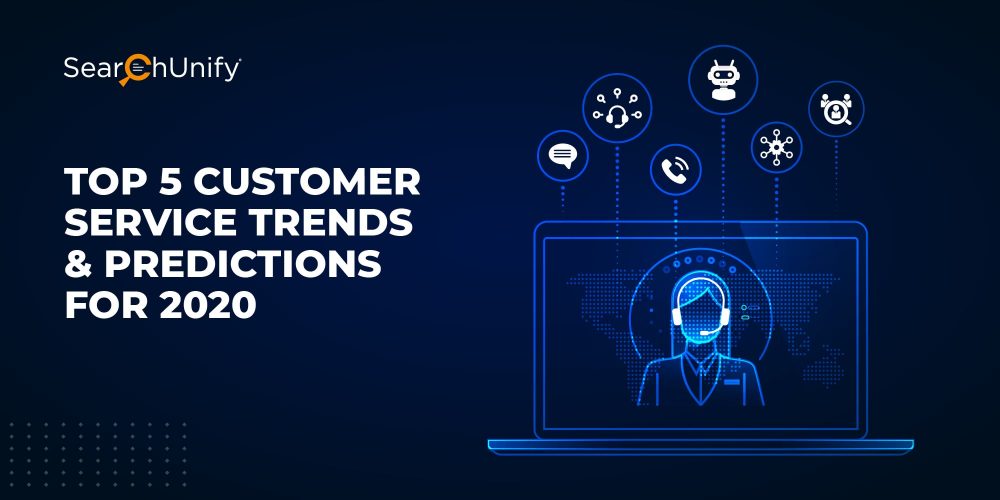
In the world of customer service, new trends emerge every day and there is too much conjecture and too little certainty.
Here’s a list of top 5 customer service trends that will actually take the businesses by storm in 2020.
1. Proactive Customer Support Is Here
Proactive customer support means predicting and preparing for cases that might not have been logged yet but will soon add to the workload of your support teams. Enterprises have heaps of data about customer behavior including web visits, community discussions they have participated in, their current usage of the product etc.
If this data is used correctly via mechanisms like sentiment analysis or predictive analysis; it can help support teams identify the pain points of their users with greater accuracy. They can use these insights to proactively create self-service content in the form of documentation or videos to give the user the required information before they really have to ask for it.
2. Self-Service Will Be Propelled by AI-Powered Chatbots
The fact that by 2020, customers will manage 85% of their relationship with the enterprise without interacting with a human speaks volumes about how AI is going to shake customer service (Source).
AI will take self-service and support interactions to a whole new level. With AI-fueled chatbots taking care of L1 queries, your support agents will be spending their valuable time on quality tasks. AI-powered chatbots are available 24*7, capable of doing mundane tasks without losing any efficiency and provide cross channel functionality.
Hence, the future is AI-powered. To add on to it, almost 50 percent of all searches will be voice searches, by 2020 (Source). So, it becomes an absolute necessity for companies to spend on tools that can collect data and have speech recognition systems that deliver relevant results. Voice search uses various things like speech patterns, personal preferences, and user intent to identify the context of search.
Firms will find legitimate reasons to invest in cognitive engines for improving the self-service experience manifold. With AI-powered search infused in different platforms across your enterprise, your users will get more relevant results. Cognitive search has the capability to analyze user search history and provide more contextual search results. Additionally, it proactively recommends articles based on past search, user profile, and clicked articles, enhancing the CX.
3. AI Will Power the Next-Gen Support Agents
Artificial Intelligence is no longer a ‘nice to have’ technology. It is transforming businesses in so many ways and if any enterprise still does not ride on the AI wave, they are going to be left behind. Its applications and benefits are huge, from powering ease of knowledge discovery, to generating robust insights; AI is a must for customer support. It is automating routine tasks that an agent does on a day-to-day basis and freeing them up for more valuable interactions.
It is now also established that AI is not here to replace but to augment your support agents. Enterprises are leveraging it for that. AI-powered apps and tools that are integrated into your support ecosystem (service consoles, CRMs, etc.) help your agents quickly find the most relevant information across all of your company’s data sources, saving valuable time, increasing employee efficiency, and accelerating case resolution. With the power of machine learning, these apps are also analyzing the customer behavior, their journeys, and recommending the best solutions/answers to your agents, improving FCR and CSAT.
4. Cookie-Cutter Personalization Won’t Cut It Going Forward
Personalization is something that was once considered an add on to enhance customer service but is now an indispensable part of it. The quickest way, if you haven’t already, to introduce personalization in your customer service practices is via ML. That’s why you can expect companies investing in adopting & training AI, more specifically, ML in the coming year to say at the very least.
In order to provide “individualized” content to users on your self-service portals and support forums, you should have AI-powered search installed that uses data across the enterprise to train itself continuously to personalize the search results. ML-based tools understand user intent from past interactions, user profile, role, behavior and recommend better, more personalized responses. For instance, a customer at the onboarding stage would be presented with content such as ‘know us’ tutorials and setup docs. On the other hand, an old customer would be displayed with more complex information.
Advanced features such as “Agent Assist” that make necessary information such as previous cases logged by a user, already seen articles, etc handy (within the console used by support reps), will empower agents to provide personalized responses.
5. Customers Will Expect Seamless Experience Across Support Channels
It takes a village to provide unforgettable customer service that drives brand loyalty and gives your customers a reason to keep coming back. Earlier, there weren’t many channels through which a customer could log an issue, usually a phone, a simple but limiting way to serve them.
We now have a wide variety of channels ranging from social media, online communities, webchats, emails and whatnot. It has empowered customers but at the same time created a gap when it comes to providing connected interactions. Most of the companies follow a process that renders their support agents helpless in identifying what had happened to the customer previously. And it annoys your customers to the core when they have to repeat their issue at different touchpoints of the company. Customers expect the support reps to know where they left the conversation and pick it up right from there.
Hence, this year is going to see a lot of investment in tech that helps deliver omnichannel support. All the interactions with customers across different channels should be captured and tagged in user history in the CRM platform used by a firm. You should integrate all communication channels with your company’s support platform. With complete customer interaction history in front, the service professionals are a step closer to provide great service without the users having to repeat the issue.
Since we’re talking about customer communication in support, it’s important to note that customers have adopted and will continue to use mobile devices (smartphones, tablets, etc) big time. This is because they are convenient, simple & allow speedy interactions. Hence, firms will be seen investing in providing a UI that enhances customer experience on a three-by-five screen. More and more service providers will offer clickable SMS, text for enabling chat conversations.
Want to delight your customers with stellar service experience? Get started Now!
Nobody can overlook the role of AI in providing world-class customer service. Neither should you. Here’s an ebook to get you started! Download it now!

















